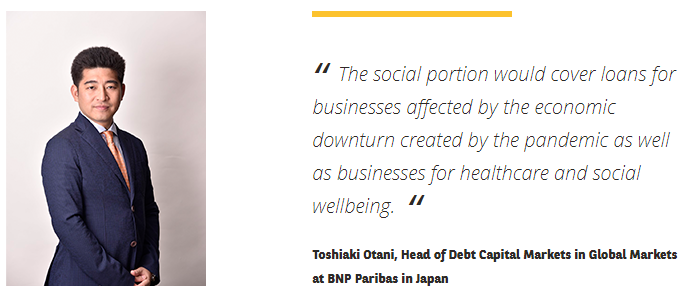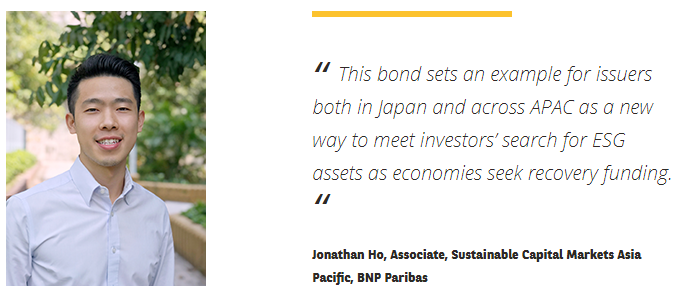The Development Bank of Japan’s latest sustainability bond is a response to both climate change and Covid-19.
Central banks and government agencies have played a critical role in responding to the global Covid-19 pandemic by reducing its economic impact and helping to promote resiliency for businesses large and small. They have also directed funding into social causes from education to supporting the unemployed and elderly.
The government-owned Development Bank of Japan (DBJ) recently issued a €600 million four-year fixed rate sustainability notes offering. The sustainability bond framework allows investment in assets dedicated to Covid-19 recovery. BNP Paribas was Joint Lead Manager on the transaction.
High investor demand for these assets has been met by a steady supply of social and sustainability bonds, expanding ESG investments beyond green assets. In 2020, social bond issuance soared to $147.7 billion – seven times the previous year’s total;[1] Refinitiv data shows that agency and sovereign issuers accounted for 56% of this total.[2] Sustainability bonds, which cover a broader use of proceeds, are also becoming more popular: issuance reached an all-time high of $47 billion in the second quarter, according to Refinitiv.[3]
Covid recovery angle in the framework
One of Japan’s leading issuers of ESG bonds, DBJ updated its Sustainability Bond framework in 2020 to focus on climate change mitigation, disaster resiliency and healthcare and social wellbeing.
“The issue in 2020 was the first time a specific Covid-19 recovery element had been included in a DBJ sustainability bond framework,” explained Toshiaki Otani, Head of Debt Capital Markets at Global Markets in Japan. “Last year they issued the first sustainability bonds under the revised framework that included a social component.”
About 70 to 80% of proceeds from the recent sustainability notes would be directed to DBJ’s clients in the form of loans for recognised green projects, such as green buildings, renewable energy, and clean transportation. “The social portion would cover loans for businesses affected by the economic downturn created by the pandemic as well as businesses for healthcare and social wellbeing,” said Otani. “Businesses in the hard-hit hospitality sector –hotels and transportation providers for example – would receive the loans.”

Rated A1 (stable) by Moody’s and A (stable) by S&P, DBJ’s track record in sustainable finance dates back to 2014, when it issued Japan’s first green bond. It has maintained a programme of regular issuance ever since, with at least one green or sustainability bond every year – this year’s is its eighth. Following its example, the financial institutions (FIG) sector in Japan has become a prolific issuer of ESG bonds. “This kind of ESG bond is very familiar in Japan – many FIG issuers do them,” explained Otani. “Overall the country ranked ninth in the world for green bond issuance last year.”[4]
Independent verification
The issuer engaged third-party sustainability consultancy ISS Corporate Solutions (ICS)[5] to provide an opinion on the environmental and social benefits of its Sustainability Bond Framework and its alignment to ICMA’s Green Bond Principles (GBP)[6], Social Bond Principles (SBP)[7] and Sustainability Bond Guideline (SBG). [8] “While these standards are voluntary in nature, alignment with ICMA guidance will help investors gain confidence that the asset is of a high standard,” said Jonathan Ho, Associate, Sustainable Capital Markets Asia Pacific at BNP Paribas. “The client has a strong sustainability credentials and this transaction is an ongoing evidence of that.”
For investors outside Asia, an analysis of DBJ’s Sustainable Bond Framework and its alignment with the European Union’s taxonomy for sustainable finance provided an additional layer of familiarity.
“Our strong network in Germany and France helped diversify the investor base,” said Otani. “Europe is the centre of the global ESG market – this deal has seen 50% – 60% of demand from continental European investors.”
Investors in search of diversification are strongly attracted to the Covid-19 features of the DBJ’s sustainability bond framework. “Those who have previously bought DBJ’s green issuances are now looking for assets of a similar standard,” explained Ho. “The Covid-19 angle is another high-quality option for their portfolios.”
Leading the way
For DBJ, sustainability bonds have become an important part of their funding mix: because the paper attracts high investor interest, the bank can secure competitive pricing. With this efficient cost of capital, it is able to provide low-margin, flexible loans to borrowers in need of growth capital and support during economic downturns – in line with its remit as a development bank.

As a leader in Japan’s capital markets, DBJ has leveraged its history as an innovator to seek fresh sources of funding for its activities. Its updated framework has enabled it to issue bonds connected to the nation’s recovery from Covid-19 at attractive rates. “Because this sustainability bond is from DBJ’s revised framework, which has elements related to both climate change and Covid-19, it is very timely,” said Ho. “This bond sets an example for issuers both in Japan and across APAC as a new way to meet investors’ search for ESG assets as economies seek recovery funding.”
[1] https://www.bloomberg.com/news/articles/2021-01-11/social-bonds-propel-esg-issuance-to-record-732-billion-in-2020
[2] https://www.refinitiv.com/perspectives/market-insights/sustainable-finance-surges-in-popularity-during-h1-2021/
[3] https://www.refinitiv.com/perspectives/market-insights/sustainable-finance-surges-in-popularity-during-h1-2021/
[4] https://www.climatebonds.net/files/files/CBI_JPN_SotM_20_02D.pdf
[5] https://www.isscorporatesolutions.com/
[6] https://www.icmagroup.org/sustainable-finance/the-principles-guidelines-and-handbooks/green-bond-principles-gbp/
[7] https://www.icmagroup.org/sustainable-finance/the-principles-guidelines-and-handbooks/social-bond-principles-sbp/
[8] https://www.icmagroup.org/sustainable-finance/the-principles-guidelines-and-handbooks/sustainability-bond-guidelines-sbg/

